Gateway NV58 (Intel) - OS Benchmarks
Wrapping up our look at OS performance on the NV58, we have our OS boot/shut down, hibernate/resume, and sleep/wake test results. As with the NV52, there was a fair amount of variability between test runs. We took the best result of numerous runs for each OS. Once more, note that Windows XP will have an advantage in the hibernate/resume testing because we are using a 32-bit OS (3GB addressable RAM) instead of a 64-bit OS (4GB addressable RAM). No OS wins - or loses - in every single category, but Windows XP and Win7 are usually near the top and Ubuntu and Vista are near the bottom.
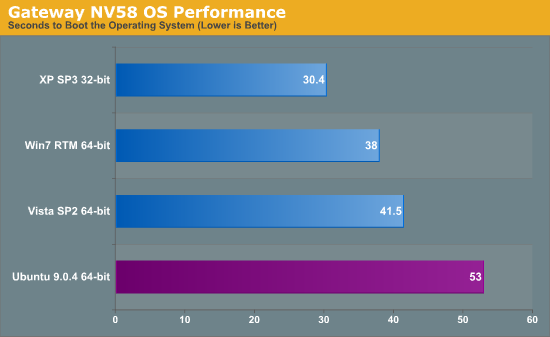
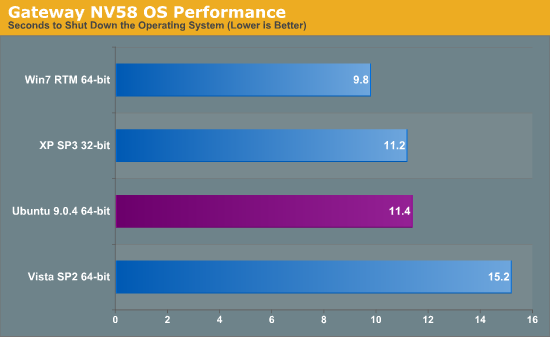
XP loads the fastest once again, this time leading the competition by a larger margin than on the NV52. Windows 7 takes 25% longer to boot, Vista takes 36% longer, and Ubuntu is in last at 74% longer than XP. The GRUB delay is a large portion of the poor showing for Ubuntu, though; it would be very close to the Vista result without the extra ~10 seconds. Shut down times new Windows 7 into the lead, with XP and Ubuntu essentially tied at around 15% longer than Vista bringing up the rear taking 55% longer than Win7.
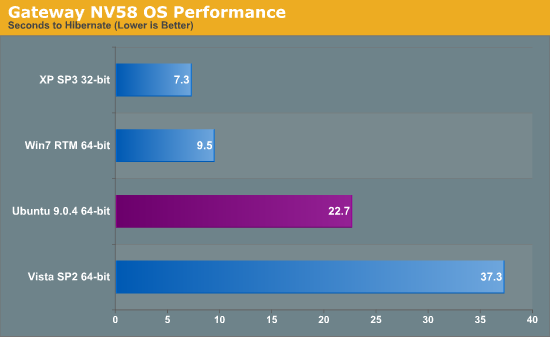
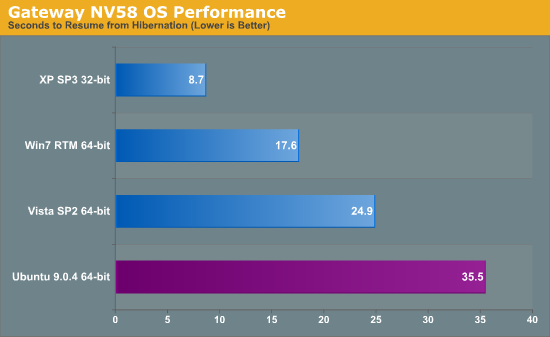
As expected, Windows XP leads in hibernate/resume times since it doesn't have to deal with as large of a hibernation file. Windows 7 trails XP in hibernate times by 30%, correlating very well with the difference in addressable memory. Ubuntu is in third place, requiring over three times as long to hibernate as XP (211% longer). The Vista result is the worst by far, taking 411% longer than XP. There's again the question of whether drivers are somehow at fault, but whatever the cause the NV58 took substantially longer to hibernate on Vista every single time. Resume times don't change the standings much, except Windows XP holds an even larger lead and takes less than half as long as the next closest competitor, Windows 7, which requires 102% more time. Windows Vista doesn't do as poorly in the resume times, though it still trails XP by 186%. Ubuntu is in last place taking just over four times as long to resume as XP, but again the 10 second GRUB penalty is at play.
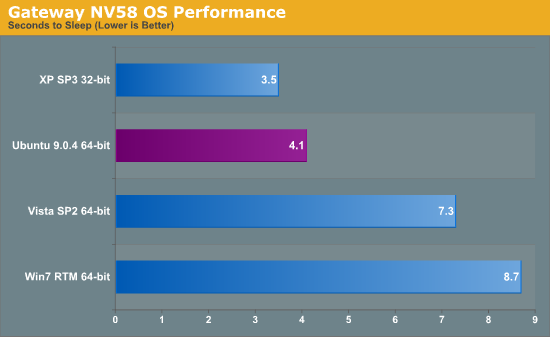
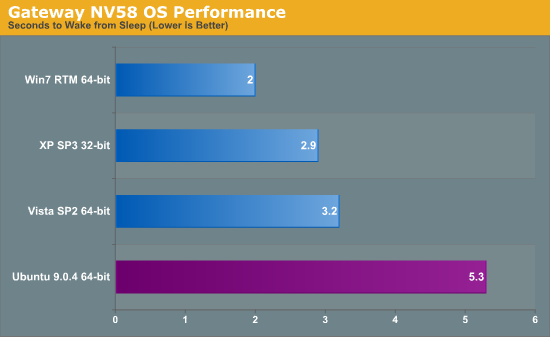
Finally, in sleep times Windows XP again leads, this time followed by Ubuntu which is very close at only 17% longer. Vista takes 109% longer than XP and for once Windows 7 brings up the rear requiring 149% longer than XP to go to sleep. Interestingly, Win7 is the fastest when it comes to waking, requiring just 2 seconds. XP and Vista are 45% and 60% longer, but they're both only around three seconds. Ubuntu is last taking 165% longer than Windows 7, with a result of 5.3 seconds. Since we're dealing with such short times with sleep/wake cycles, the raw percentages and charts aren't nearly as meaningful. As mentioned before, Ubuntu and Win7 tend to be a little more consistent, whereas the best-case results for XP and Vista can be an order of magnitude faster than the worst-case results. If nothing else, Ubuntu is very consistent at going to sleep in around 5-10 seconds; Windows 7 sleep times range from just under 9 seconds up to around 30 seconds, and XP and Vista can take over a minute to go to sleep at times. The difference between 5 seconds and 10 seconds is somewhat annoying, but it's not a huge issue unless you're putting your system to sleep constantly. Occasional delays of over a minute on the other hand can be truly frustrating. For what it's worth, toss in an SSD and the sleep/wake times all appear to be far more consistent (though we didn't conduct in-depth testing on either of these notebooks with SSDs).










106 Comments
View All Comments
JarredWalton - Monday, September 21, 2009 - link
Links please? I'm not a Linux guru by any stretch of the imagination, so if there's a "better" Linux option out there for testing I'm willing to give it a look. Ideally, I need something similar for the AMD platform.prince34 - Monday, September 21, 2009 - link
You could always look a UNR(Ubuntu Netbook Remix) as a netbook distro. It's what I use on mine. I've done some comparisons to XP on it, and it seems to follow the trends you are seeing, but not with as much disparity.http://www.ubuntu.com/GetUbuntu/download-netbook">http://www.ubuntu.com/GetUbuntu/download-netbook
smitty3268 - Monday, September 21, 2009 - link
I'm not sure Moblin is really a "mainstream" linux option at this point, it's more of an Intel "look at what we can do on netbooks" research project. It does supposedly have 5 second boot times. I suspect your tests here are almost completely dependent on the browser and Flash anyway, and the video drivers. All areas that Linux does not excel at - battery and performance testing of Linux + Apache or file serving would no doubt be much better.http://moblin.org/downloads">http://moblin.org/downloads, if you really want to try it.
smitty3268 - Monday, September 21, 2009 - link
Or the LiveCD version: http://moblin.org/documentation/test-drive-moblin">http://moblin.org/documentation/test-drive-moblinsmitty3268 - Monday, September 21, 2009 - link
Firefox for Linux is well known to be terribly slow and unoptimized compared to the Windows version. It would be interesting to see the battery results from running the Windows version through WINE on Ubuntu, just to see how that compares - I know it blows the Linux native version away as far as javascript performance is concerned, and I'm sure Flash is the same. You could also try Chrome, since I've heard it works quite fast, even though it's still in beta.Chlorus - Monday, September 21, 2009 - link
But how could that happen? I thought Linux was the most awesome OS ever? All the people on slashdot said so! Are you saying they lied? M$ SHILL!!!smitty3268 - Tuesday, September 22, 2009 - link
If you read what I was saying, it doesn't have anything to do with linux, it's a Firefox problem. They've got performance bug reports that say, "fixed, for windows. we could do this for linux but not worth the effort." They don't even enable profiled compilation, which is good for a 10-15% boost on windows.smitty3268 - Monday, September 21, 2009 - link
Also, Ubuntu 9.04 (and other distros released last spring) had a terrible, terrible regression with Intel video driver performance. I'm not sure how much that really affects battery life, but it definitely could. Something to keep in mind, anyway, as you compare the differences between the two laptops.andrewaggb - Tuesday, September 22, 2009 - link
It's true about the intel driver, but let's be honest, if it wasn't the graphics driver it'd be pulse audio, or using 64 bit instead of 32 bit firefox, ext4 whatever... Seems linux get's alot of excuses for it's problems.I'm pretty tired of ubuntu and fedora. Releasing half-finished, barely tested, OS's to the masses is not doing linux a favour, but as the answer to everything is it's fixed in svn... you're kinda stuck.
JarredWalton - Monday, September 21, 2009 - link
I followed a guide on fixing Intel GPU performance in Ubuntu... I don't know if it really worked or not, but here's the reference:http://ubuntuforums.org/showthread.php?t=1130582">Jaunty with Intel Performance Guide. I stayed with the default kernel and the "Safe" configuration, which may be partly to blame for suboptimal results. Then again, the ATI platform fared worse under Jaunty.